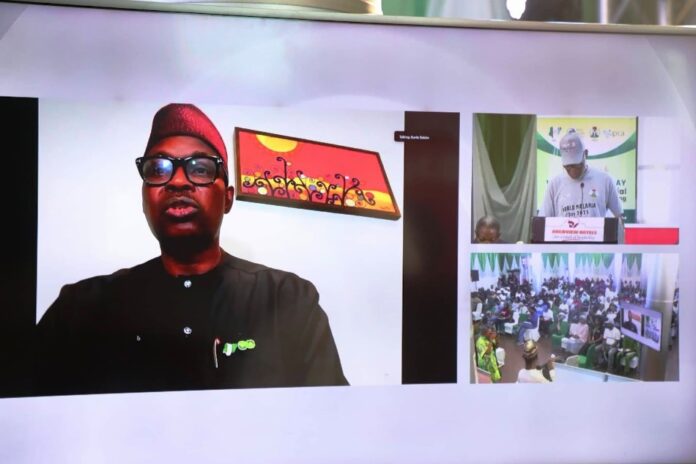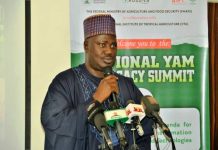
……………..Providing 30 million Under-Five Children With Malaria Preventive Medicines.
The Federal Government is targeting achieving a Malaria Free Nigeria by 2030 with several preventive measures including reaching 30 million children with Malaria preventive medicines.
In achieving its objective; the Federal Government has made adequate budgetary allocation to fill the funding gap that is created by the freeze in USAID/PMI malaria elimination activities; for procurement of essential Malaria commodities, including ACTs (Artemisin based Combination Therapies), diagnostic kits and, preventive medication for pregnant women in the affected states.
The Minister affirmed the treatment will be delivered through the Seasonal Malaria Chemo prevention (SMC) Programme in 21 eligible states, all in the northern region.
This year’s commemoration is themed – “Malaria Ends with Us: Reinvest, Reignite, Reimagine”.
Dr. Iziaq Adekunle Salako Honourable Minister of State for Health and Social Welfare announced this while speaking virtually at the World Malaria Day commemoration. It was organized by the National Malaria Elimination Program (NMEP) and the Malaria Council in collaboration with the Gates Foundation.
He further added that interventions include increasing access to and use of insecticide- treated mosquito nets slated for implementation in 12 states in 2025.
“The states include Akwa-Ibom, Delta, Kaduna, Kano, Katsina, Kebbi, Nasarawa, Niger, Ondo, Oyo, Taraba and Yobe”.
Describing the country’s malaria burden as worrisome with Nigeria bearing 27 percent of global Malaria cases and 31 percent of global deaths, according to the 2024 World Malaria Report; the Minister said the deadly disease remained a top public health crisis, affecting children under five and pregnant women and, disrupting economic productivity and family incomes.
The Government, Dr. Salako emphasized, will address this scourge through a multi- pronged strategy under the Rethinking Malaria Initiative.
Central to this is the phased introduction of the Malaria vaccine which has already reached 80,000 children in Kebbi and Bayelsa states. The vaccine Programme, he pointed out, will expand to 17 more states in 2025, targeting children aged 5 to 23 months.
Additionally, government in its bid to eliminate mosquitoes in their breeding source has initiated a plan to pilot for the first time, Laval Source Management in six states which include Abia, Borno, Ekiti, Lagos, Ondo and, Rivers.
Supporting these initiatives are two national surveys, the Rapid Impact Assessment and the Malaria Indicator Survey which are being launched to monitor the effectiveness of current interventions and inform future policies, the Minister noted.
While praising the high- level political support for malaria elimination by President Bola Ahmed Tinubu GCFR; the Minister acknowledged contributions by frontline health workers, domestic and international partners, including the Nigeria End Malaria Council chaired by Alhaji Aliko Dangote, a key player in mobilizing private sector resources to complement government funding.
Earlier, the Permanent Secretary Daju Kachollom mni, highlighted the country’s efforts against the disease, stressing, it is a high burden that the federal government has over the years tried to bring down.
She admonished Nigerians to take malaria seriously, emphasizing if you have the symptoms, go to the hospital.
The Federal Government, according to the Permanent Secretary, has greatly subdidized the treatment of malaria, especially in the primary health care sector.
“So if you have malaria, go to the primary healthcare sector”.
As a nation, we have made significant strides in reducing the burden of malaria . Our efforts have led to a decline in malaria cases by 20% and deaths by 25%”, the Permanent Secretary further stated.
Signed
Alaba Balogun
Deputy Director
Information and Public Relations
28 April 2025





